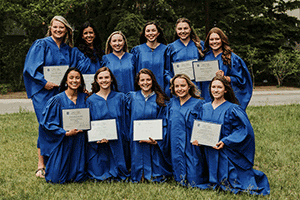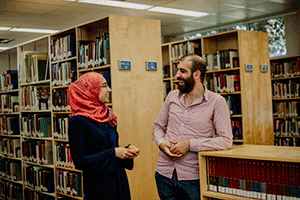Ready to learn more?
Get all the details straight to your inbox!

Luther College students are U of R students and receive all the same benefits. Upon graduation you will receive a U of R degree.

Free enrolment counselling support and invaluable one-on-one academic advising are available for all programs at Luther College.

Luther College students are eligible for nearly $100,000 in academic awards – in addition to scholarships and bursaries awarded by the U of R.

You can book a tour of Luther College, the U of R campus, and our student residence, The Student Village at Luther College, any time throughout the year. Contact our Recruitment Office at 1-306-206-2117.

Luther College is recognized for its high standards of teaching, focused research, and one-on-one academic advising. We value and protect this heritage of excellence in scholarship, freedom of inquiry, and faithful seeking after truth.

Smaller class sizes at Luther College means more individualized attention and better connections with your professors, classmates, and academic advisors.

The Luther Library has over 24,000 items in its collection, 5,000 books checked out per year, and 7,000 students who come through its door per month.

Luther students can register in Arts, Science, or Media, Art, and Performance. Luther students are U of R students and receive a U of R degree.
Get all the details straight to your inbox!
Liz Coleman’s call for a reinvention of the liberal arts is part of a growing trend among academics and public intellectuals to help bring about what is being called the 21st-century Enlightenment. Similar to its 18th-century counterpart, this new Enlightenment has at its core a vigorous intellectual life combined with healthy civic engagement. Unlike its predecessor, this new Enlightenment has the potential to be backed by economic, institutional, and social resources that were unheard of in the 18th century, among them mass literacy, sophisticated communications technologies, and generally healthy and well-fed populations. We stand poised to bring about the kinds of social ideals envisioned by radical thinkers of the earlier period—a world in which reason drives out superstition; in which childhood development is not hindered by high infant mortality; in which economic prosperity, driven by a robust free market economy, guarantees that the potential of each individual is not blighted by grinding poverty, nor the inner voice of the mind drowned out by the howl of an empty stomach. In many ways, it seems that we have already achieved what they so desperately wanted. At first blush, it looks as though thinkers such as Rousseau, Voltaire, Godwin, and Wollstonecraft would, if plunked in the middle of North America in 2011, smile approvingly and declare, “Job well done.”
Or would they? I imagine one aspect of our 21st-century world that would bewilder these Enlightenment thinkers is the curious place in our culture of what we call the “liberal arts.” During the first Enlightenment, cultural pursuits formed an essential part of the development of the mind, not simply as an adjunct to political, technical, or commercial activity, but as a fundamental part of what it meant to be an educated human being. In fact, as literacy levels began to rise, so did an anxiety among classically-trained scholars that the definition of “education” was going to mean more than just acquisition of Latin and Greek, thus robbing them of their monopoly on knowledge and their access to political and social power. At the same time, many celebrated the fact that opening up education to the middle and even lower classes, and broadening the scope of what one learned in schools beyond classical texts, could result in a vigorous and lively culture that can persuade people to consider themselves as valuable as much for their inner lives as their worth as labour. This is, by the way, one reason why Shakespeare—whose middle-class origins and relative lack of classical education were powerful components of his mystique—was chosen as the best literary example of what this new Enlightenment could achieve. At the same time, it is no accident that the rise of the novel—a literary genre that allows for the exploration of the inner lives of its often-bourgeois characters—happened alongside movements urging mass literacy, more representational democracies, and the abolition of slavery. It is not an overstatement to say that, while technology, politics, and economics were all important to the development of the modern world, the modern world itself would never have come into being without the arts.
Yet, much has changed in the intervening centuries. Thanks in part to the 19th-century philosophy of Positivism, and its latter-day descendent, Scientism, we have developed a culture in which the arts are frequently seen as luxury appendages to what is generally held to be the more important activities of technology, commerce, and administration. Matthew Taylor has argued that 21st-century culture has been largely defined by what he calls “the logics of progress”: the logic of science and technology, which argues that anything that promotes quantifiable knowledge and its applications is inherently good; the logic of commerce, which argues that anything that can be bought and sold should be put on the open market; and the logic of bureaucracy, which argues that anything that promotes rule-making and administration for its own ends is worthwhile. What these logics have in common, apart from their unquestioned centrality in public discourse, is they are inherently quantifiable and commodifiable; they reinforce a view of the world that thinks in terms of countable objects, of objective facts and concrete realities, be they statistics, commodities, or laws.
By these three logics, education must be purely pragmatic; its sole function is to equip people to take their place as components of one of these three areas. In political discourse, this generally means that when politicians bother to talk about post-secondary education at all, they generally talk about building up technical training programs that will create jobs and, ultimately, satisfy the marketplace. Their view of education draws its conceptual framework from the world of commerce—specifically, of manufacturing—so that university graduates become a kind of product that is shipped to workplaces factory-ready, pre-assembled, and even with a money-back guarantee. All employers need do is plug and play. It’s a view that privileges a particular idea of knowledge, and reinforces a particular view of society: that the so-called “hard” disciplines of applied science, commerce, and—to a lesser degree—social sciences are more worthwhile and valuable to the public sphere than the so-called “soft” disciplines one finds in the humanities. Inevitably, when university budgets are drawn up, this sets faculties and departments against each other, each competing for limited resources and each attempting to justify its existence, sometimes to the point of annihilation for the unsuccessful.
This is, by any standard, a deplorable state of affairs. The markers by which one measures the success of a society are not innate, and certainly do not necessarily need to be ones that translate into quantifiable data, such as employment levels or productivity statistics. These are important, of course, and any government that ignored these would rightly be deemed irresponsible. But they need not be the only markers of success. In fact, such data can easily be manipulated to satisfy whatever political point one wishes to make. The ability to think critically and creatively, to ask penetrating questions, to look beyond mere technical training to begin to envision multiple answers to complex questions: these are the skills that generate real progress in any society, and cannot be acquired simply by focusing on quantifiable data alone. Moreover, citizens who see the liberal arts as necessary aspects of public life tend to think less in terms of data, numbers, and statistics, and to think more about the human realities behind those statistics.
This is not a case of glorifying the liberal arts over professional, technical training. Such nonsense would only bring us back to the arbitrary and unnecessary competitiveness I mentioned in the previous paragraph. But the liberal arts are routinely so devalued in public discourse that one needs to plead their case to have then recognised at all. Indeed, it should be immediately obvious—although it is not—that a society that values creativity, abstract thought, and critical thinking as much as it values technical know-how and market worth can be considered a truly advanced, progressive society. In other words, a society that values that which a liberal arts education uniquely can develop in its citizens is a society that can truly call itself “enlightened.”
At the same time, we cannot entirely blame politicians and university administrators for the perceived irrelevancy of the liberal arts. Coleman points out that liberal arts education in universities has shut itself out of public discourse both by its increasing specialization and its obscurantism. Coleman’s point about what happens to a Jane Austen novel in the hands of deconstructionists is well taken, and well understood even by some literary scholars themselves. In 1991, Anne Matthews skewered the pretensions of the annual MLA Conference in her notorious New York Times article, “Deciphering Victorian Underwear, and Other Seminars.” Her image of the pompous, geek-chic intellectual gleefully blathering incomprehensibly to other pompous, geek-chic intellectuals—and to grad-student intellectual wannabes—about the politics of corsets or the literary underpinnings of rap lyrics seemed to confirm the notion of the academy as a Cloud-Cuckoo-Land that has nothing useful to say about or to average people enduring real problems, such as trying to feed three preschool-age kids on a minimum-wage salary obtained from a job at which you are sexually harassed and barely allowed bathroom breaks. Seen in this light, a liberal arts education is not a measure of society’s advancement; it’s just an obscenely expensive waste of time.
That is not, of course, what the original Enlightenment imagined by promoting mass literacy and the centrality of what we know as the liberal arts in education. Matthews’ academics are the descendents of Martinus Scriblerus, the idiotic classical scholar created by Alexander Pope, Jonathan Swift and other 18th-century wits as a satire on exactly the kind of useless “learned lumber” that shines at MLA. Coleman calls for a radical re-thinking of the liberal arts within society—at the heart of her vision is a re-engagement with civic life that the self-serving MLA intellectuals of Matthews’ piece had contemptuously ignored. In this, of course, Coleman is not alone, and some progressive universities are beginning to send the message that the liberal arts can provide individuals with exactly the skills they need to engage as robust citizens, not merely as job-ready labour components. The tools to think critically; the ability to express oneself articulately; a healthy knowledge of history, geography, and politics; an understanding of human behaviour and social systems: who wouldn’t want such things? How are these not useful to any society that wants to call itself enlightened? Only in this: unless academics can demonstrate how academic knowledge both equips one for and encourages one to participate in civic engagement, it will fall prey to the charge of irrelevance and silliness that plagues the liberal arts.
One place to start is to assert that the liberal arts have been marginalised in public discourse for far too long. To Taylor’s “three logics” I would add a fourth: the logic of the liberal arts. By this logic, anything that promotes a full development of individual human potential, even at the expense of one of the other three logics, must be considered and encouraged. This means that not only do the liberal arts assume a centrality in public discourse as a space where ethical concerns can be evaluated, multiple answers to single questions can be considered and tested, and creative alternate realities explored as means to realising larger goals beyond economic prosperity or political power, but that the liberal arts themselves are compelled to engage actively within public discourse, to consider their own activities not merely as self-serving intellectual pursuits, but as inherently useful and even crucial activities that are truly valued by the society which supports them. Simply put: the liberal arts need to be valued and respected in public discourse as much as technology, commerce, or administration—but if the liberal arts wish to gain this value and respect, they must also demonstrate their civic engagement.
This means, of course, that liberal arts education itself must change, and it must change in ways that require academics to collapse many of the distinctions they themselves have made and to reconsider their place within the world they inhabit. A reconfigured liberal arts education must consider the following:
These are challenging ideals, and are certainly open to debate. But the point of asking these questions is to lift oneself out of the narrow focus of one’s own disciplinary boundaries and to consider carefully exactly how our special body of knowledge really is going to transform the way our students will interact with the world. At the same time, we need to see other disciplines and faculties not as adversaries but as allies in the establishment of this new Enlightenment. And we need to drive home the point, to as many as will listen, that the logics of progress, important as they are, are not the only logics at work, or even the most valuable logics for a healthy society. The logic of the liberal arts compels us to remove the walls of statistics, bottom lines, and rules, and see face to face the real human beings so often hidden behind them.